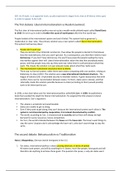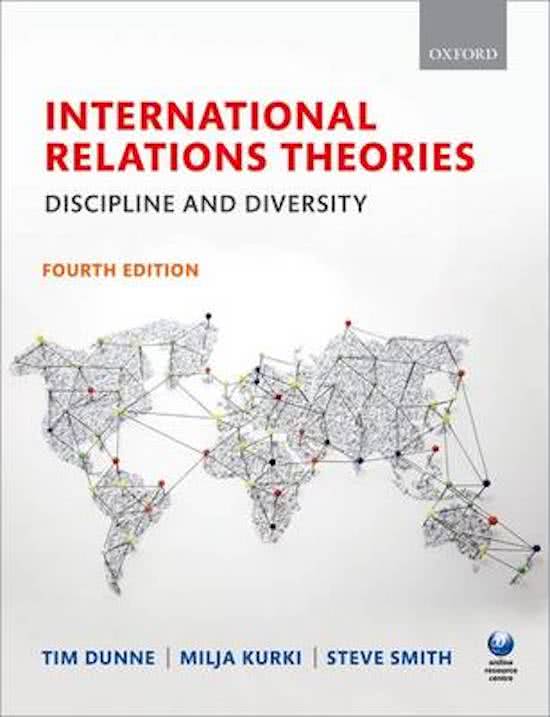DEF: An IR myth, is an apparent truth, usually expressed in slogan form, that an IR theory relies upon
in order to appear to be truth.
The first debate: Liberal internationalism vs Realism (winner)
The first chair of international politics was set up by a wealth welsh philanthropist called David Davis
in 1919. He set it up in order to further the cause of world peace after the first world war.
People looked at the international system and said it failed. This system had no governor's,
moderation or clear rules. The primary solution was a new system called liberal internationalism.
This system had two key ideas:
1. People don't want war
They are led into it by militaristic aristocrats. If we allow the people to decide for themsleves
how the state behaves, then you won’t get war. As a consequence, you therefore need to have
democracy. If you don't have democracy, the you'll have powerful people leading the many
into warfare against their will. Liberal internationalists retain the idea that everybody wants
peace, and that people may only say they want war when they're confused about what they
want. This means the solution is to just educate states about what they really want.
2. The international institutional structures were to blame
There was no formal system; rather there were states competing with one another, relying on
diplomacy to stop conflict. The solution was a new international intuitional structure - The
league of nations (LN). LN provided security to member nations. It gave reassurance that with
conflict, there can be reconciliation between states. To them, states were rational, and that
rationality made this solution possible because no state (according to them) would possibly
want to be destroyed by war.
In 1936, a new chair takes over for international politics called E.H. Carr. In 1939, he published a
book that sounded the death for liberal internationalism. He assigned the title utopia to Liberal
Internationalism. Carr's argument:
▪ This utopia is unrealistic and unachievable
▪ States are unable to get to along
▪ Even if they want to get along, they can't because the international system won't allow it. The
system is not characterised by cooperation, it is instead characterised by conflict.
▪ The world, according to Carr, is characterised by scarcity and so there will always be high
demand for scarce resources, hence competition.
▪ For Carr, the world id divided between the haves and the have nots. The Have's want things to
stay the same. Utopians don't acknowledge the have not's, who don't want things to stay the
same.
The second debate: Behaviouralism vs Traditionalism
Hans J. Morgenthau, German Jewish immigrant in the U.S.
1. For states, international politics is about pursing interests, in terms of power
All states want power, and will do anything for it. States, much like people, have goals and will
therefore do anything to achieve those goals. The question this poses, is why do states want






